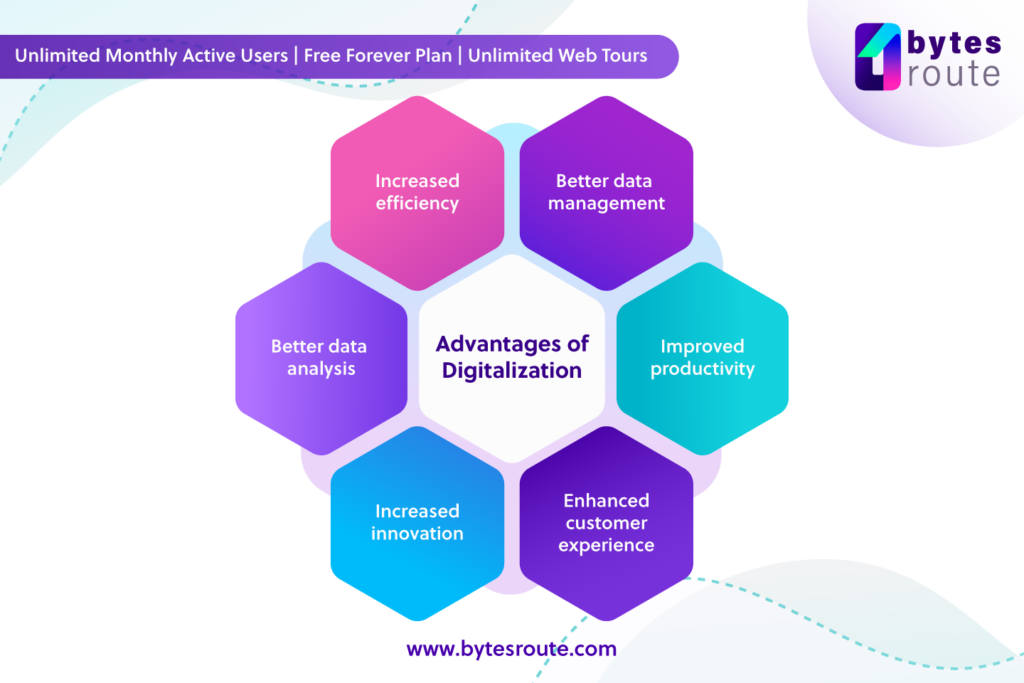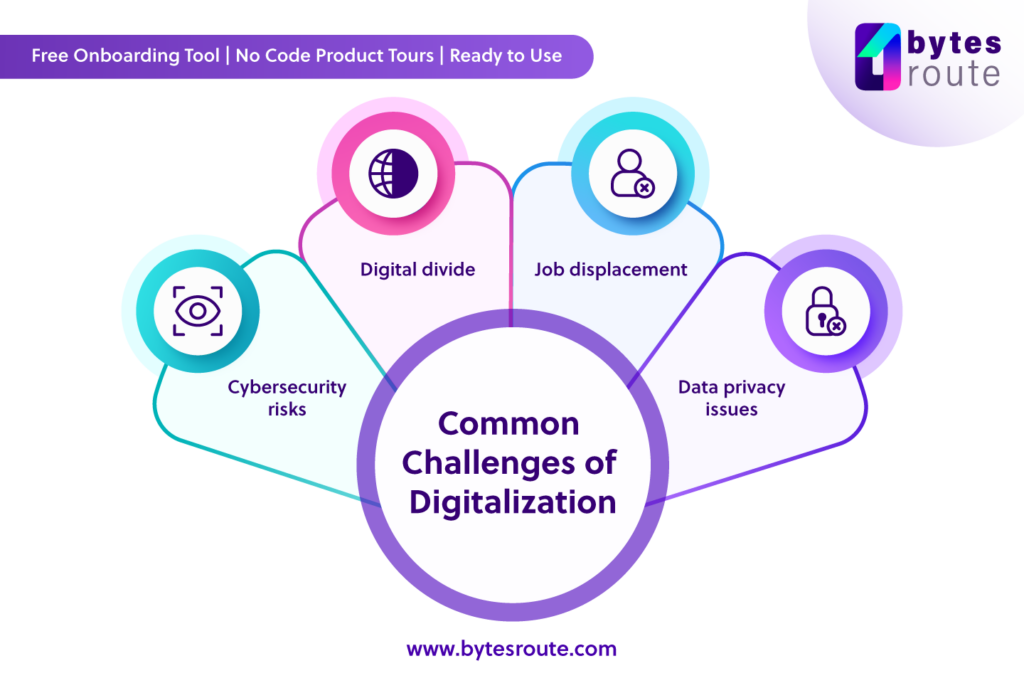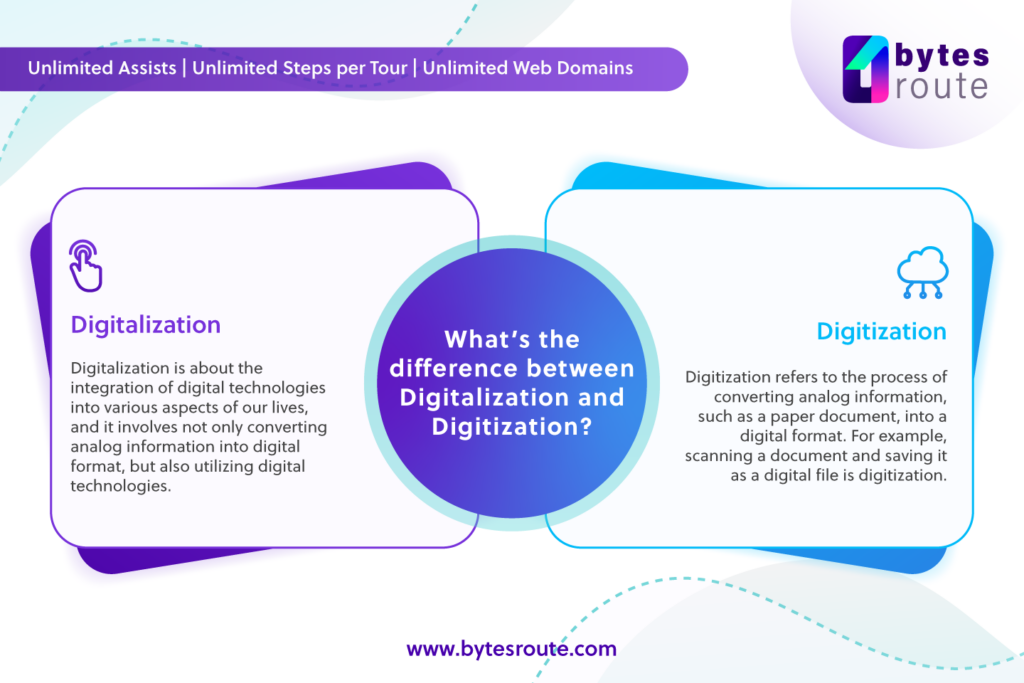What is Digitalization?
Digitalization refers to the integration of digital technologies into various aspects of our lives, such as business, education, healthcare, and entertainment. This involves not only converting analog information into digital formats, but also using digital technologies to streamline and optimize processes, improve services, and enhance customer experiences.
Why is Digitalization important?
The impact of digitalization on our daily lives and professional activities cannot be understated. The wide range of digital tools for storing, managing, and analyzing data has contributed to greater productivity, innovation, and improved decision-making.
In addition to this, digitalization has also made it possible to access information and services from anywhere at any time, which has made us more connected and informed than ever before. This has had a significant impact on many aspects of our lives, including education, healthcare, and social interaction.
Businesses and organizations benefited the most from digitalization, since it has made it easier for them to implement digital technologies like automation, artificial inteIligence, and machine learning to improve efficiency and customer service which are significant factors in today’s competitive business environment.
What are the Advantages of Digitalization?

The various benefits and advantages of digitalization have led to its growing importance in today’s world. Some of the most important reasons for going digital are:
- Increased efficiency: Digitalization allows businesses to save time and money by automating manual processes, reducing paperwork and improving overall efficiency.
- Improved productivity: Digitalization’s variety of useful tools and technology can boost productivity by making it simpler and faster for people and businesses to collaborate and share information and ideas.
- Better data management and analysis: The ability to digitally collect, store, and analyze massive volumes of data is empowering businesses and organizations to enhance their decision-making, spot trends, and optimize their processes.
- Enhanced customer experience: Online shopping, mobile applications, and chatbots for customer care are just a few examples of how digitalization is helping businesses deliver individualized experiences and services to their customers.
- Increased innovation: By the use of digital technologies, digitalization encourages innovation by giving businesses the means to experiment with fresh concepts and create new products and services.
To sum up, digitalization may improve the quality of life for individuals, businesses, and the entire community by allowing them to work smarter, faster, and more creatively, and by allowing businesses to offer superior products and services to their customers.
The Challenges of Digitalization

While digitalization has brought many benefits, it also comes with some significant challenges.
Here are some of the main challenges of digitalization:
- Cybersecurity risks: The risk of cyber-attacks and data breaches grows as more data and information is stored and exchanged digitally. Hackers and other harmful actors are capable of stealing sensitive information, disrupting systems, and causing financial damage. Individuals, corporations, and governments all face ongoing cybersecurity challenges.
- Digital divide: Despite widespread use, not everyone has equal access to digital technologies. Some people, particularly in rural areas and developing nations, lack reliable internet connectivity and digital gadgets, limiting their capacity to fully engage in the digital economy.
- Job displacement: Process automation by digital technology has the potential to result in job displacement, particularly for low-skilled individuals. This can cause social and economic upheaval and requires a comprehensive strategy of education and training to guarantee that people obtain the skills needed to adapt to a changing employment market.
- Data privacy: In the digital age, the collecting and use of personal data has become common. Yet, this has created privacy and data protection issues. People are not always aware of how their data is being utilized, and there have been numerous incidents of data breaches compromising personal information.
To ensure digital technologies are used ethically and sustainably for the benefit of everybody, these issues emphasize the necessity for careful control and regulation of these tools.
The importance of digitalization in customer experience
By providing a seamless and efficient customer experience, digitalization has changed the way businesses connect with their customers. Customers can browse products, make purchases, track their deliveries, and offer feedback from anywhere and at any time thanks to digital technology such as mobile apps, websites, and social media. People nowadays have grown to expect this degree of convenience and customization.
Companies can also use consumer data to deliver a more personalized experience by recommending products or services that customers might be interested in. This type of personalized experience boosts consumer satisfaction and enhances the likelihood of repeat business.
Chatbots are a great digital tool to answer common queries and address difficulties in customer support, where artificial intelligence and machine learning are also becoming more widespread. This enables businesses to provide their consumers with 24/7 help, which is critical in a world where people seek quick and efficient solutions to their problems.
Digitalization has transformed the way businesses connect with their customers, making it easier and more convenient for them to obtain products and services. Businesses may provide a more personalized and efficient experience, leading to higher customer satisfaction and loyalty, by exploiting consumer data and utilizing modern technologies such as AI and machine learning.
Digitalization versus Digitization

The terms “digitalization” and “digitization” are frequently used interchangeably, but they have significantly different meanings.
Digitization refers to the process of converting analog information, such as a paper document, into a digital format. For example, scanning a document and saving it as a digital file is digitization.
On the other hand, “digitalization” is a broader term that encompasses the integration of digital technologies into various aspects of our lives, such as healthcare, education, business, and entertainment. Digitalization involves not only converting analog information into digital format but also utilizing digital technologies
To summarize, while “digitization” refers to the act of transforming analog information into digital format, “digitalization” refers to the broader transformation of our society and economy through the incorporation of digital technologies into our daily life.